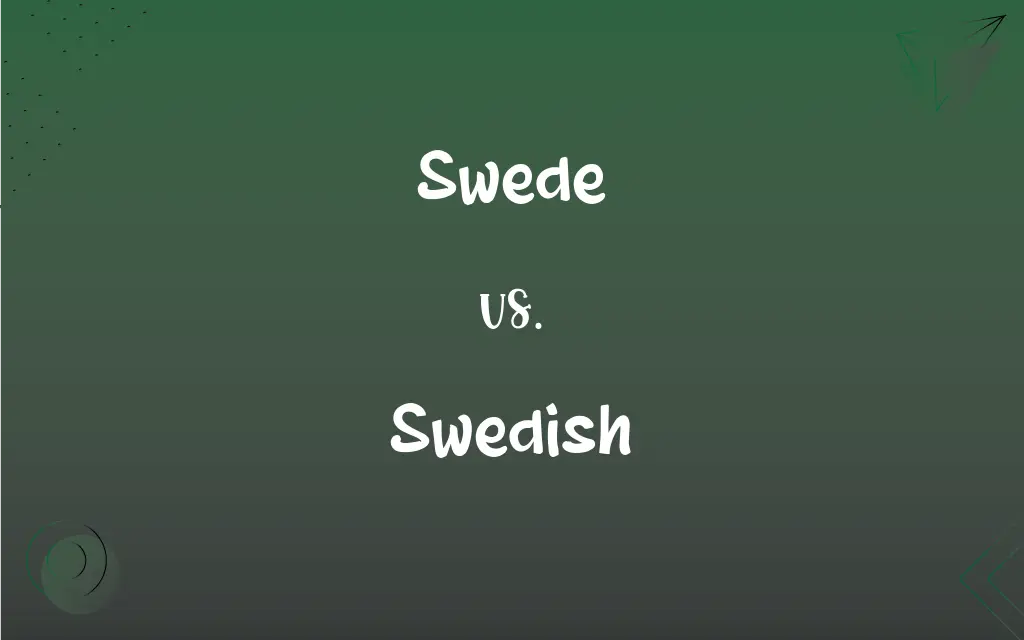Swede vs. Swedish: What's the Difference?
By Harlon Moss & Janet White || Updated on May 23, 2024
Swede refers to a person from Sweden or a type of root vegetable, while Swedish describes something related to Sweden, such as language, culture, or nationality.

Key Differences
Swede can refer to an individual from Sweden. When used in this context, it denotes a person who is a national or resident of Sweden. On the other hand, Swedish is an adjective describing anything related to Sweden, such as the language spoken by Swedes, the culture, or other attributes of the country.
Swede also has a culinary meaning. In this sense, it is a type of root vegetable, also known as rutabaga in North America. Swedish, however, does not have this meaning and is solely used to describe something that pertains to Sweden.
In terms of language, a Swede speaks Swedish. Swedish is the official language of Sweden, and it belongs to the North Germanic group of the Germanic languages. It is distinct from the term Swede, which refers specifically to the people.
When discussing nationality, someone from Sweden is called a Swede. Their cultural practices, traditions, and language are referred to as Swedish. This differentiation helps in specifying whether the reference is to the people (Swedes) or their attributes (Swedish).
Swede, as a term for the vegetable, is used in British English, whereas in American English, the same vegetable is called rutabaga. This highlights a regional difference in terminology that does not apply to Swedish, which remains consistent as a descriptor for anything from Sweden.
ADVERTISEMENT
Comparison Chart
Primary Meaning
Person from Sweden
Related to Sweden
Secondary Meaning
A root vegetable (rutabaga)
N/A
Language Aspect
A Swede speaks Swedish
The language spoken in Sweden
Usage
Refers to individuals or vegetable
Refers to culture, language, and attributes of Sweden
Regional Term
Swede (British English vegetable)
N/A
ADVERTISEMENT
Swede and Swedish Definitions
Swede
Someone of Swedish descent.
The restaurant is owned by a Swede.
Swedish
Pertaining to Sweden.
We enjoyed the Swedish countryside.
Swede
Person from Sweden.
A Swede won the Nobel Prize this year.
Swedish
Language spoken in Sweden.
She is fluent in Swedish.
Swede
Root vegetable, also known as rutabaga.
I added Swede to the stew for extra flavor.
Swedish
Relating to Swedish culture.
The Swedish festival was colorful and vibrant.
Swede
Native of Sweden.
The Swede enjoyed showing us around Stockholm.
Swedish
Associated with Swedish traditions.
Swedish customs are interesting to learn about.
Swede
A native or inhabitant of Sweden.
Swedish
Of or relating to Sweden, the Swedes, or their culture or language.
Swede
A person of Swedish ancestry.
Swedish
The North Germanic language of Sweden and parts of Finland.
Swede
See rutabaga.
Swedish
Of or pertaining to Sweden or its inhabitants.
Swede
The fleshy yellow root of a variety of rape, Brassica napus var. napobrassica, resembling a large turnip, grown as a vegetable.
Swedish
The language of Swedes.
Swede
The plant from which this is obtained.
Swedish
A Scandinavian language that is the official language of Sweden and one of two official languages of Finland
Swede
The turnip.
Swedish
Of or relating to or characteristic of Sweden or its people or culture or language;
The Swedish King
Swedish punch
Swedish umlauts
Swede
The head.
Swedish
Describing Swedish nationality.
The Swedish team played well in the tournament.
Swede
To produce a low-budget remake of a film without the use of professional actors or filming techniques.
Swede
A native or inhabitant of Sweden.
Swede
A Swedish turnip. See under Turnip.
Swede
A native or inhabitant of Sweden
Swede
A cruciferous plant with a thick bulbous edible yellow root
Swede
The large yellow root of a rutabaga plant used as food
Swede
Resident or national of Sweden.
The Swede moved to New York last summer.
FAQs
Is Swede used in American English?
As a vegetable, Swede is more commonly known as rutabaga in American English.
What does Swedish refer to?
Swedish refers to anything related to Sweden, including its language, culture, and nationality.
Is Swede used only for people?
No, Swede can also refer to a type of root vegetable.
What is the origin of the term Swede?
Swede originates from Old Norse and is used to denote people from Sweden.
How do you use Swede in a sentence?
e.g., "The Swede explained their traditions to us."
Are Swede and rutabaga the same?
Yes, Swede is called rutabaga in North America.
How do you use Swedish in a sentence?
e.g., "She enjoys listening to Swedish music."
What is a Swede?
A Swede is a person from Sweden or a type of root vegetable known as rutabaga.
Is Swedish a noun?
No, Swedish is primarily an adjective, but it can be used as a noun to refer to the language.
What language do Swedes speak?
Swedes speak Swedish.
Can Swedish describe a person?
No, Swedish describes attributes related to Sweden, not the people themselves.
What is the origin of the term Swedish?
Swedish comes from the Old English term “Swēoðeod,” meaning the people of the Swedes.
Is Swedish always capitalized?
Yes, Swedish is always capitalized.
Can Swede refer to a group of people?
Yes, Swedes refers to the people of Sweden.
Do Swedes celebrate specific Swedish traditions?
Yes, Swedes celebrate various traditional Swedish holidays and customs.
Is Swede always capitalized?
When referring to a person, yes. When referring to the vegetable, no.
Are Swede and Swedish interchangeable?
No, Swede refers to a person or vegetable, while Swedish refers to language or cultural attributes.
Can Swedish refer to things other than people or language?
Yes, it can refer to anything related to Sweden, like culture or traditions.
Is Swede a commonly used vegetable in the UK?
Yes, Swede is commonly used in British cuisine.
Is Swedish widely spoken?
Swedish is spoken mainly in Sweden and parts of Finland.
About Author
Written by
Harlon MossHarlon is a seasoned quality moderator and accomplished content writer for Difference Wiki. An alumnus of the prestigious University of California, he earned his degree in Computer Science. Leveraging his academic background, Harlon brings a meticulous and informed perspective to his work, ensuring content accuracy and excellence.
Co-written by
Janet WhiteJanet White has been an esteemed writer and blogger for Difference Wiki. Holding a Master's degree in Science and Medical Journalism from the prestigious Boston University, she has consistently demonstrated her expertise and passion for her field. When she's not immersed in her work, Janet relishes her time exercising, delving into a good book, and cherishing moments with friends and family.
































































